- Home
- Jr. Horatio Alger
Mark Mason's Victory: The Trials and Triumphs of a Telegraph Boy Page 11
Mark Mason's Victory: The Trials and Triumphs of a Telegraph Boy Read online
Page 11
CHAPTER XI.
MR. HAMILTON SCHUYLER IS ASTONISHED.
THE jeweler took from his case two diamond rings. They were large,brilliant, and showy.
"How do you like the appearance of these rings?" he asked.
"They are beautiful!" exclaimed Mark admiringly.
"Don't you think the lady would admire them?"
"I should think so, sir."
"What should you think they are worth?"
"A hundred dollars apiece," guessed Mark.
"If the diamonds were genuine, one would be worth three hundred andfifty dollars and the other four hundred."
"Are they not genuine?" asked Mark in surprise.
"Paste, my boy, paste. The gold, however, is real. Instead of beingworth the sum mentioned, one is worth perhaps three dollars and a half,the other four dollars."
"But I shouldn't think it would be worth your while to keep falsediamond rings."
"Nor would it if all persons were honest. I never sell them. I only sellgenuine jewelry. I will let you understand the use I mean to make ofthem. These two rings I mean to have you carry to Mrs. Montgomery onForty-Seventh Street."
"But suppose she takes them for genuine?"
"Then I will make them so. In other words, I will take out the pastediamonds and replace them with real stones. If on the other hand anyfraud is intended it won't benefit her much."
"Very well, sir. I think I understand."
"You must to a certain extent exercise your own discretion. I judgedfrom the observations I made the other afternoon that you are a boy whopossesses that important quality."
"Thank you for the compliment."
"I will tell you what made me suspect the woman of whom I have spoken.First, the name. She calls herself Mrs. Philip Montgomery. It soundslike a fictitious name. Again, she is a stout, rather common-lookingwoman, with a florid complexion and larger features. Now Montgomery isan aristocratic name. Again, she says she is from Buffalo. Swindlersgenerally hail from some distant city. Then again, it is rathersuspicious that she should be in such haste.
"The purchase is an important one, and the amount to be paid--sheherself fixed the approximate value--is considerable. You would thinkshe would wish to inspect my stock carefully before making a selection.Instead of this she only asked to have two rings sent up to her of thevalue of three or four hundred dollars, and she would make choice of oneof them."
"It does look rather suspicious, sir."
Mr. Swan gave Mark some further directions, and the latter started uptown on the Eighth Avenue horse cars, which he took on the lower side ofthe Astor House.
"This is new business to me," thought Mark. "I feel an interest to seethis Mrs. Montgomery. If she is planning to entrap me, she won't make asmuch as she anticipates."
Mark had the rings, each in a little morocco case, carefully laid awayin the inside pocket of his coat.
When they reached Canal Street, to Mark's surprise, his cousin Edgarentered the car. He did not recognize Mark at first, the latter nolonger wearing the messenger's uniform.
"How do you do, Cousin Edgar?" said Mark.
Edgar turned sharply around.
"Oh, it's you, is it?" he said. "Please don't call me cousin."
"I am just as much ashamed of the relationship as you are," respondedMark with a comical smile.
"That is impertinent. Besides it isn't true. Have you been dischargedfrom the telegraph service?"
"No; what makes you think so?"
"Because you are not wearing the uniform."
"I am working for a party that doesn't want me to wear it while in hisservice."
"Who is it?"
"I don't feel at liberty to tell."
"Oh, just as you like. Isn't that a new suit?"
"Yes."
"Where did you get it?"
"I bought it."
"Business seems to be pretty good with you. How much did it cost?"
"Eighteen dollars."
"Is it paid for?"
"Of course it is."
"I didn't know but you might have bought it in installments."
"I don't have to do that."
"Yet you pretended a little while since that you and your mother hadhard work to get along."
"Business is looking up."
Edgar got out at Twenty-Third Street. Mark kept on till he reachedForty-Seventh Street. He walked toward Seventh Avenue, and finallystood in front of the house in which the customer for the diamond ringswas staying. It was a plain three-story residence with nothing peculiarabout it. Mark rang the bell, little suspecting what was in store forhim.
A boy of about seventeen, shabbily dressed, answered the bell.
"Is Mrs. Montgomery at home?" asked Mark, referring to a card.
"I guess so," answered the boy.
"I should like to see her."
"All right! I'll go up and ask."
The boy left Mark standing in the doorway, and went up-stairs.
He returned in a very short time.
"You're to come up," he said.
Mark followed him up the staircase and into a back room. It was scantilyfurnished. There was a lounge on one side of the room, and a cabinet bedon the other. These, with three chairs and a bureau, constituted thefurniture.
"Just step in here," said the boy, "and I'll call Mrs. Montgomery."
Mark took a seat on the sofa and awaited the arrival of the lady.
He did not have long to wait. The door opened, but the lady he expecteddid not appear. Instead, a young man entered whom Mark instantlyrecognized as the person who had left the Fifth Avenue stage undersuspicious circumstances on the day when the old lady was robbed of herpocketbook.
Mark started and wondered if the recognition was mutual. It did notappear to be.
"You're the jeweler's boy, I believe?" said the newcomer languidly.
"I came from Henry Swan."
"Exactly, and you have brought two diamond rings with you?"
"Yes."
"All right! You can show them to me."
Mark's suspicions were aroused and he felt that he had need of all hisshrewdness. He was very glad now that the diamonds were paste and therings of little value.
"Excuse me," he said, "but I was told to deliver the rings to Mrs.Philip Montgomery.
"Yes, that's all right. Mrs. Montgomery is my aunt."
"I should like to see her," persisted Mark.
"Come, boy, you're too fresh. It'll be all the same if you hand therings to me."
"I don't think so. Isn't Mrs. Montgomery at home?"
"Yes, but she has a severe headache and cannot see you at present."
"Then perhaps I had better call again."
"No you don't. I am a gentleman and won't permit you to insult me."
"What do you want to do?"
"To take the rings up to my aunt. If she likes them, or either of them,she will send you down a check."
Mark reflected a moment. Remembering that the rings were not valuable,he decided to show them.
"Here are the rings!" he said, producing them from his pocket.
The young man opened the small caskets, and his eyes lighted up withsatisfaction when he saw the glittering rings.
"What is the price?" he asked, looking up.
"That ring is three hundred and fifty dollars, the other is fourhundred."
"Seven hundred and fifty together."
"Yes."
"I will show them to my aunt. Perhaps she may decide to keep both."
"You won't be long?" asked Mark, as the young man left the room.
"No, I'll be back as soon as my aunt decides."
Left alone Mark began to think over the situation. His recognition ofhis unprincipled acquaintance of the Fifth Avenue stage convinced himthat some fraudulent scheme was being carried out. Mrs. Montgomery wasprobably a confederate of the young man who had just left the room.
"Is he going up-stairs or down?" thought Mark.
He listened, and thought he
heard the front door open and shut. Itoccurred to him to open the door of the chamber and look down-stairs.
He started to do this, but to his surprise found that the door wasfastened in some way. He had not heard a key turned in the lock.Possibly there was an outside bolt.
"What object can they have in keeping me a prisoner?" he asked.
Should he ring the bell and summon a servant? If he did so, he wouldhave to leave the house in a state of uncertainty. No! he decided towait and let further events throw a light on the mystery.
Meanwhile the young man who had possessed himself of the rings left thehouse, for it was he who had descended the stairs and gone out into thestreet. He bent his steps to the nearest pawnshop on Eighth Avenue, andtaking out one of the boxes, said in a nonchalant voice:
"What will you loan me on this magnificent diamond ring?"
The pawnbroker took the box, and drawing out the ring held it up in thebest light. He examined it through a magnifying glass, and a gleam ofintelligence flashed in his face.
He returned to the counter, and scrutinizing the young man who hadpresented it asked in a matter-of-fact tone, "What do you want to borrowon the ring, my friend?"
"Two hundred dollars," answered the customer promptly.
"Humph!" said the pawnbroker with an amused smile, "two hundred dollarsis a large sum of money."
"Yes, but the ring cost three hundred and fifty dollars. I am asking alittle more than half price."
"So! the ring cost three hundred and fifty dollars! Did you pay thatprice for it?"
"No, the ring does not belong to me."
"Then to whom does it belong?"
"To my aunt, Mrs. Philip Montgomery."
"I do not know the lady. Does she live in the city?"
"No, she lives in Buffalo."
"And she sent the ring to you?"
"Yes, she sent it to me. She is in want of a little money, and did notlike to ask her husband for it, for he might not be pleased. So shewants to borrow money on this ring which was given her by her brother atthe time of her marriage."
"So, so! And your aunt would like me to lend her two hundred dollars onthe ring?"
"Yes, sir."
"I think you will have to carry it to some other pawnbroker, my friend!"
"I don't mind taking a little less," said the young man, who was anxiousfor more than one reason to realize on the ring at once.
"How much now do you call a little less?"
"Well, say a hundred and seventy-five dollars. Probably my aunt will beable to redeem it in a few weeks."
"If I give you a hundred and seventy-five dollars," laughed thepawnbroker, "I think your aunt will let me keep it for good."
"As to that," said the young man impatiently, "I can make no promises.How much will you give on it?"
"I might give you a dollar and a half," answered the pawnbrokercomposedly.
"A dollar and a half!" exclaimed the young man, clutching at the counterfor support. "A dollar and a half on this magnificent diamond ring, forwhich my aunt paid three hundred and fifty dollars! What do you mean?"
"I mean not to be cheated, my friend. How much do you think this_magnificent_ ring is worth?"
"I have told you what it cost."
"My friend, you are very much mistaken. The ring cost only three dollarsor three and a half."
"What do you mean?" gasped the visitor, turning pale.
"I mean that it is not diamond, but paste."
"But--it came from a jeweler of great reputation. Surely you have heardof Mr. Henry Swan."
"Yes, I have heard of Mr. Swan. If you will bring him here, and he willsay that the diamond is real, I will see if I can't give you more."
"Wait!" said the customer hurriedly, drawing out the other casket. "Lookat this ring, and tell me what it is worth."
The pawnbroker took it to the window and examined it attentively.
"That may be worth four dollars," he answered, after a brief pause.
"And is this stone false also?"
"Yes, my friend."
"Then I won't pawn either. Here, give me back both rings."
"Here they are."
"I am afraid you are not a good judge of diamonds. I am sure they arereal."
"Go somewhere else, my friend, and satisfy yourself. If you can find anyone in my line who will give you five dollars for either, you had bettertake it and call yourself a fortunate man. Will you leave your name?"
"My name is Hamilton Schuyler, and I live on Second Avenue."
"It is a very good name, my friend. I think you must belong to the FourHundred."
"I do," answered Schuyler haughtily.
"It is a pity you should have to pawn your aunt's diamonds, and suchdiamonds!" chuckled the pawnbroker.
But Mr. Schuyler had already left the shop, and was hurrying along theavenue to another of the same class at which he had occasionally haddealings.

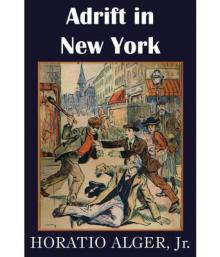 Adrift in New York: Tom and Florence Braving the World
Adrift in New York: Tom and Florence Braving the World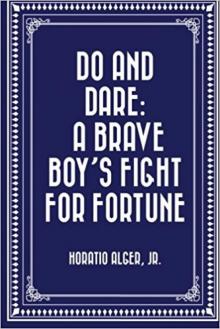 Do and Dare — a Brave Boy's Fight for Fortune
Do and Dare — a Brave Boy's Fight for Fortune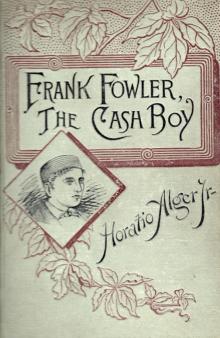 The Cash Boy
The Cash Boy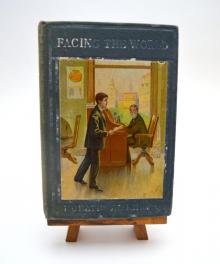 Facing the World
Facing the World The Young Explorer; Or, Claiming His Fortune
The Young Explorer; Or, Claiming His Fortune The Store Boy
The Store Boy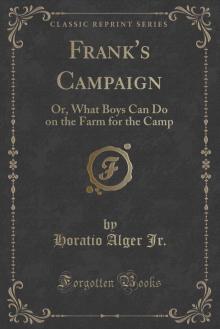 Frank's Campaign; Or, The Farm and the Camp
Frank's Campaign; Or, The Farm and the Camp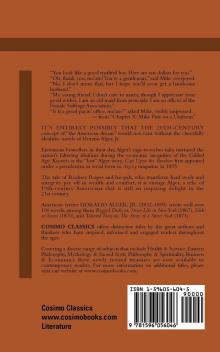 Cast Upon the Breakers
Cast Upon the Breakers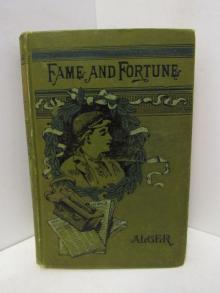 Fame and Fortune; or, The Progress of Richard Hunter
Fame and Fortune; or, The Progress of Richard Hunter The Errand Boy; Or, How Phil Brent Won Success
The Errand Boy; Or, How Phil Brent Won Success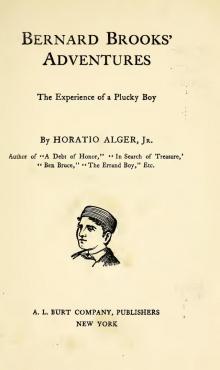 Bernard Brooks' Adventures: The Experience of a Plucky Boy
Bernard Brooks' Adventures: The Experience of a Plucky Boy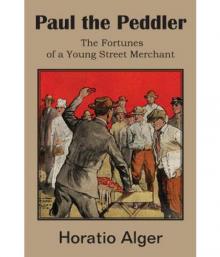 Paul the Peddler; Or, The Fortunes of a Young Street Merchant
Paul the Peddler; Or, The Fortunes of a Young Street Merchant Brave and Bold; Or, The Fortunes of Robert Rushton
Brave and Bold; Or, The Fortunes of Robert Rushton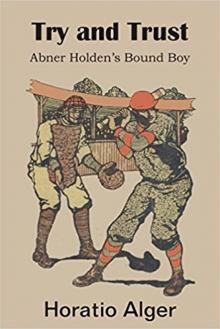 Try and Trust; Or, Abner Holden's Bound Boy
Try and Trust; Or, Abner Holden's Bound Boy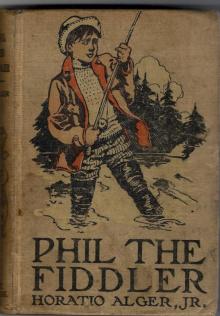 Phil, the Fiddler
Phil, the Fiddler In A New World; or, Among The Gold Fields Of Australia
In A New World; or, Among The Gold Fields Of Australia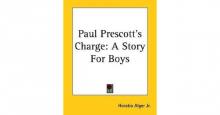 Paul Prescott's Charge
Paul Prescott's Charge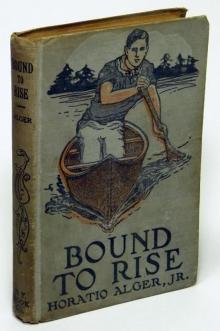 Joe's Luck; Or, Always Wide Awake
Joe's Luck; Or, Always Wide Awake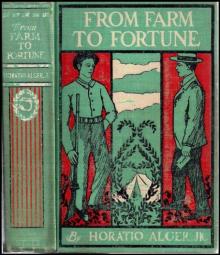 From Farm to Fortune; or, Nat Nason's Strange Experience
From Farm to Fortune; or, Nat Nason's Strange Experience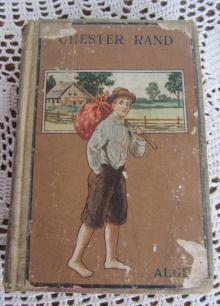 Chester Rand; or, The New Path to Fortune
Chester Rand; or, The New Path to Fortune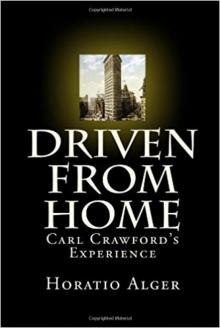 Driven from Home; Or, Carl Crawford's Experience
Driven from Home; Or, Carl Crawford's Experience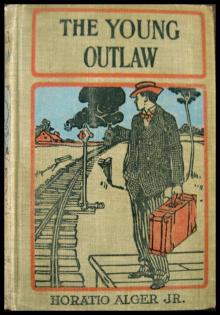 The Young Outlaw; or, Adrift in the Streets
The Young Outlaw; or, Adrift in the Streets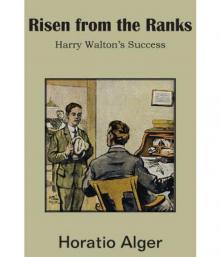 Risen from the Ranks; Or, Harry Walton's Success
Risen from the Ranks; Or, Harry Walton's Success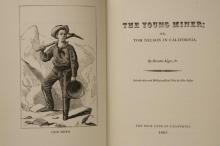 The Young Miner; Or, Tom Nelson in California
The Young Miner; Or, Tom Nelson in California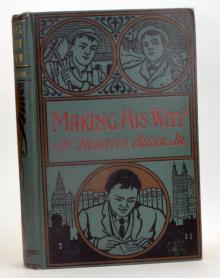 Making His Way; Or, Frank Courtney's Struggle Upward
Making His Way; Or, Frank Courtney's Struggle Upward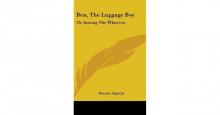 Ben, the Luggage Boy; Or, Among the Wharves
Ben, the Luggage Boy; Or, Among the Wharves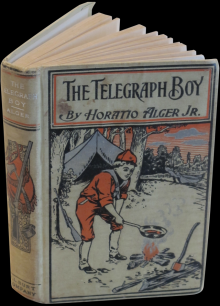 The Telegraph Boy
The Telegraph Boy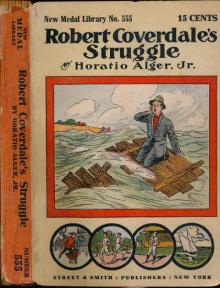 Robert Coverdale's Struggle; Or, on the Wave of Success
Robert Coverdale's Struggle; Or, on the Wave of Success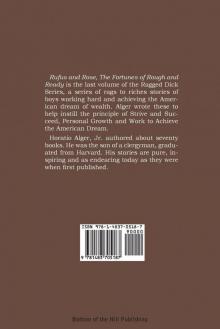 Rufus and Rose; Or, The Fortunes of Rough and Ready
Rufus and Rose; Or, The Fortunes of Rough and Ready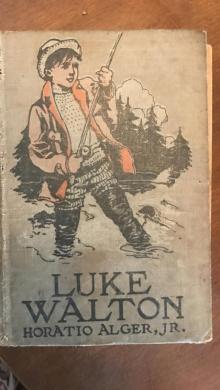 Luke Walton
Luke Walton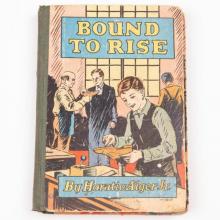 Mark Mason's Victory: The Trials and Triumphs of a Telegraph Boy
Mark Mason's Victory: The Trials and Triumphs of a Telegraph Boy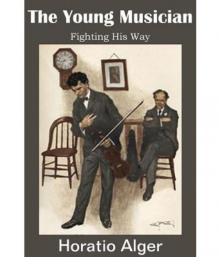 The Young Musician; Or, Fighting His Way
The Young Musician; Or, Fighting His Way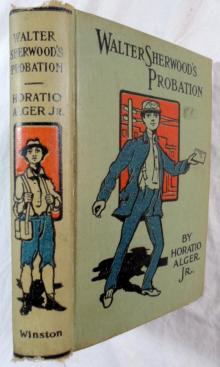 Walter Sherwood's Probation
Walter Sherwood's Probation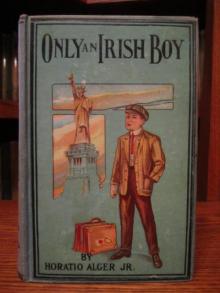 Only an Irish Boy; Or, Andy Burke's Fortunes
Only an Irish Boy; Or, Andy Burke's Fortunes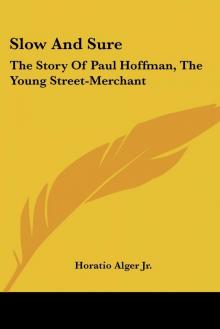 Slow and Sure: The Story of Paul Hoffman the Young Street-Merchant
Slow and Sure: The Story of Paul Hoffman the Young Street-Merchant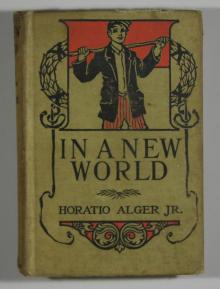 Herbert Carter's Legacy; Or, the Inventor's Son
Herbert Carter's Legacy; Or, the Inventor's Son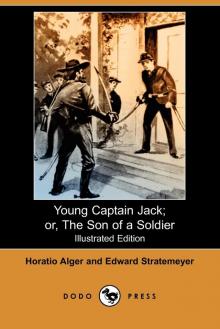 Young Captain Jack; Or, The Son of a Soldier
Young Captain Jack; Or, The Son of a Soldier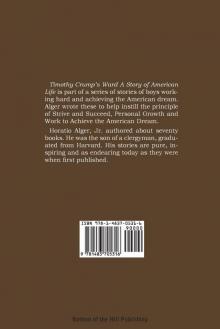 Timothy Crump's Ward: A Story of American Life
Timothy Crump's Ward: A Story of American Life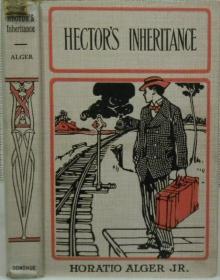 Hector's Inheritance, Or, the Boys of Smith Institute
Hector's Inheritance, Or, the Boys of Smith Institute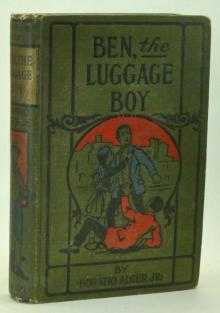 Ben's Nugget; Or, A Boy's Search For Fortune
Ben's Nugget; Or, A Boy's Search For Fortune